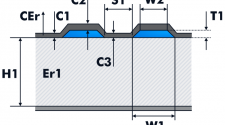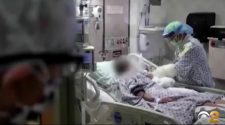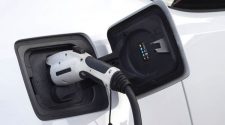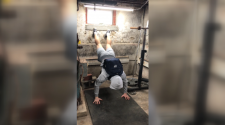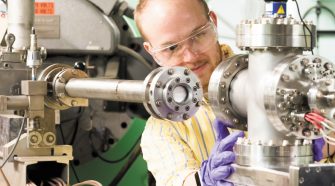28 firms nationwide get access to the tech; cost-effective system aimed for use in offices, retail areas and indoor public spaces
The Centre has warned the public that COVID can spread through minute aerosol particles carried in the air across 10 metres. This means it is imperative to keep the air clean in buildings such as offices, retail outlets, classrooms and other indoor public spaces.
While keeping the doors and windows open for cross-ventilation would be ideal, it is not always feasible. At present, sanitisers and disinfectants are available for cleaning surfaces such as door knobs, furniture, keyboards, taps and switches that are touched by multiple users. However, there is no effective system in place to disinfect indoor air.
Hence, ‘cleaning’ the air with the use of cutting-edge technology gains importance. For this, the Central Scientific Instruments Organisation (CSIO) of the Council of Scientific and Industrial Research (CSIR) has developed a technology that uses ultraviolet (UV) rays to finish off viruses, bacteria and other microbes.
Related news: Leave doors, windows open: Here is Centre’s new COVID advisory
The technology can be used to disinfect HVAC (heating, ventilation and air conditioning) ducts so that clean air circulates in the room. This helps in continuous sanitising of work places including offices, apart from educational institutions and places like retail shopping areas that have a lot of footfall.
Corporate stakeholders
CSIO-CSIR has selected 28 companies to transfer the technology to, so that it can be manufactured on a commercial scale for quick deployment across the country.
According to Prof S, Anantha Ramakrishna, Director of CSIR-CSIO, the technology developed by the Fabrionics Division of CSIO, led by Harry Garg, is now available for deployment throughout the country through these 28 companies. UV-based sanitisation products are being developed by the Fabrionics Division for other situations also, he said.
Among the 28 companies is Tamil Nadu-based Chola Geo Energy. In Kerala, Softrays Power Solutions and TICEON-HSE LLP have been chosen. Unisem Electronics Ltd and Alpine Linear of Karnataka have also been given access to the technology, according to the Ministry of Science & Technology. Among others chosen in South India are Sriyas Engineering, Cenaura Technologies and Saras Engineering & Projects from Hyderabad.
Various companies from Maharashtra, Haryana, Punjab, Uttar Pradesh, Rajasthan and Odisha have also been provided with the technology.
What the technology does
The technology is relatively simple to operate. By just switching on the UV system, along with air conditioning, it is possible to get rid of airborne viruses, bacteria and fungi.
The technology deploys UV-C radiation that is known for its disinfectant properties and is easy to use. (The UV radiation spectrum is divided into three regions called UV-A, UV-B and UV-C). Existing HVAC ducts have to be only retrofitted with UV lights rather than bringing in any new equipment. In use for several years, UV radiation is known to clear surfaces, air and even water of viruses, bacteria and fungi within seconds.
The CSIR-CSIO product is tested for more than 99% disinfection and could be used as a simple retrofit solution to air handling units of buildings, transport vehicles and other spin-off applications, the Ministry said.
The UV-C is known to be an energy efficient system, improving airflow through coils. It enhances indoor air quality, requires less maintenance, and is easy to retrofit with any existing system having air ducts. The initial setup cost is also low, the statement added. The system comes with commercialized standards and certifications.
Installation of ultra-violet light-based solutions may boost people’s confidence and facilitate a return to work places, public transport and educational institutions, the Ministry said in a statement.
In recent months, increasing evidence has emerged about the airborne nature of COVID transmission. It has raised concern among WHO and health authorities in several countries.
Behind the research
The Indian Council of Medical Research (ICMR) recently emphasised on ventilation, as airborne transmission is a major risk in indoor settings. It recommended keeping windows open for free air circulation.
Research carried out by CSIR constituent labs — the Cellular and Molecular Biology (CSIR-CCMB) and the Institute of Microbial Technology (CSIR-IMTECH) — in September 2020 had demonstrated experimentally that SARS-CoV-2 viral particles can be detected in air even after two hours of exit of infected persons from a room and at distances far more than a few metres.
To mitigate this risk, the CSIR-CSIO embarked on a project to develop an effective retro-fit UV device with high intensities to handle fast airflows. These can be fitted with minimal intervention in air-ducts of existing HVAC systems. The effort resulted in the designing of the UV-C air duct disinfection system, the statement said.
Use of this system will provide a relatively safer environment for indoor activities amid the pandemic. The technology has been developed according to the requirements for deactivation of the SARS-CoV-2 virus contained in an aerosol with necessary ventilation measures, adequate safety, and bio-safety standards, the statement added.
UV-C deactivates over 99% of viruses, bacteria, fungus and other bio-aerosols with appropriate dosages using 254nm UV light.
Addresses fungal infections, too
Use of UV-C may also help in ameliorating the fungal infections being witnessed during the current wave of the pandemic, with an increasing number of black fungus and white fungus cases across several states.
When fitted on to existing air conditioners, these UV devices can eliminate microbes at the ducts so that air free of coronavirus is circulated into indoor spaces.





